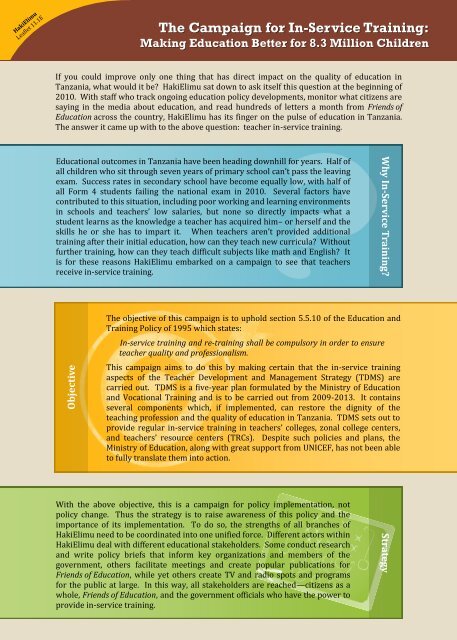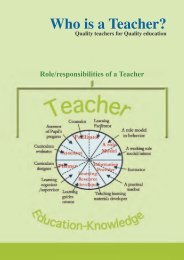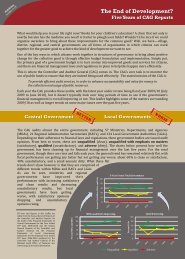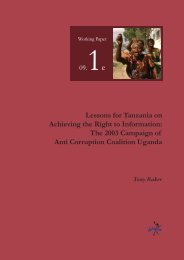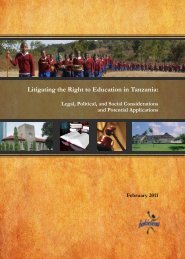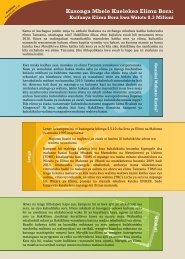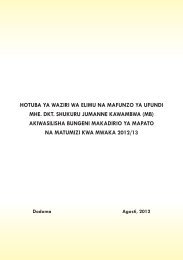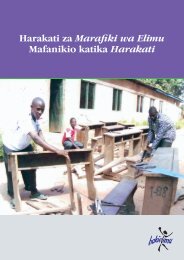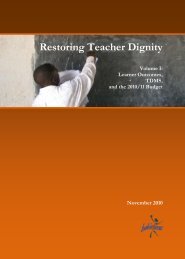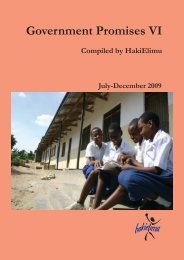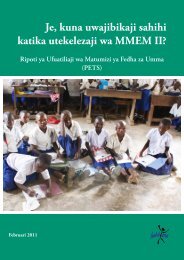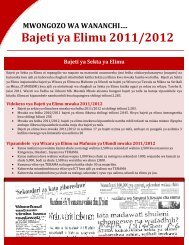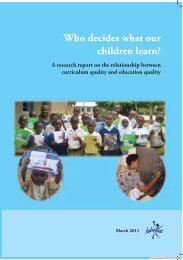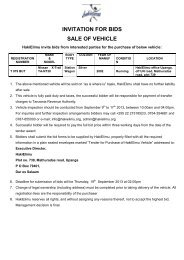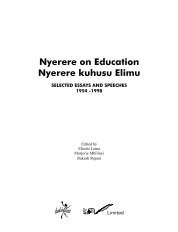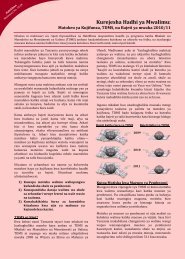The Campaign for In-Service Training: - HakiElimu
The Campaign for In-Service Training: - HakiElimu
The Campaign for In-Service Training: - HakiElimu
Create successful ePaper yourself
Turn your PDF publications into a flip-book with our unique Google optimized e-Paper software.
Objective<br />
Strategy<br />
Why <strong>In</strong>-<strong>Service</strong> <strong>Training</strong>?<br />
<strong>HakiElimu</strong><br />
Leaflet 11.1E<br />
<strong>The</strong> <strong>Campaign</strong> <strong>for</strong> <strong>In</strong>-<strong>Service</strong> <strong>Training</strong>:<br />
Making Education Better <strong>for</strong> 8.3 Million Children<br />
If you could improve only one thing that has direct impact on the quality of education in<br />
Tanzania, what would it be? <strong>HakiElimu</strong> sat down to ask itself this question at the beginning of<br />
2010. With staff who track ongoing education policy developments, monitor what citizens are<br />
saying in the media about education, and read hundreds of letters a month from Friends of<br />
Education across the country, <strong>HakiElimu</strong> has its finger on the pulse of education in Tanzania.<br />
<strong>The</strong> answer it came up with to the above question: teacher in-service training.<br />
Educational outcomes in Tanzania have been heading downhill <strong>for</strong> years. Half of<br />
all children who sit through seven years of primary school can’t pass the leaving<br />
exam. Success rates in secondary school have become equally low, with half of<br />
all Form 4 students failing the national exam in 2010. Several factors have<br />
contributed to this situation, including poor working and learning environments<br />
in schools and teachers’ low salaries, but none so directly impacts what a<br />
student learns as the knowledge a teacher has acquired him– or herself and the<br />
skills he or she has to impart it. When teachers aren’t provided additional<br />
training after their initial education, how can they teach new curricula? Without<br />
further training, how can they teach difficult subjects like math and English? It<br />
is <strong>for</strong> these reasons <strong>HakiElimu</strong> embarked on a campaign to see that teachers<br />
receive in-service training.<br />
<strong>The</strong> objective of this campaign is to uphold section 5.5.10 of the Education and<br />
<strong>Training</strong> Policy of 1995 which states:<br />
<strong>In</strong>-service training and re-training shall be compulsory in order to ensure<br />
teacher quality and professionalism.<br />
This campaign aims to do this by making certain that the in-service training<br />
aspects of the Teacher Development and Management Strategy (TDMS) are<br />
carried out. TDMS is a five-year plan <strong>for</strong>mulated by the Ministry of Education<br />
and Vocational <strong>Training</strong> and is to be carried out from 2009-2013. It contains<br />
several components which, if implemented, can restore the dignity of the<br />
teaching profession and the quality of education in Tanzania. TDMS sets out to<br />
provide regular in-service training in teachers’ colleges, zonal college centers,<br />
and teachers’ resource centers (TRCs). Despite such policies and plans, the<br />
Ministry of Education, along with great support from UNICEF, has not been able<br />
to fully translate them into action.<br />
With the above objective, this is a campaign <strong>for</strong> policy implementation, not<br />
policy change. Thus the strategy is to raise awareness of this policy and the<br />
importance of its implementation. To do so, the strengths of all branches of<br />
<strong>HakiElimu</strong> need to be coordinated into one unified <strong>for</strong>ce. Different actors within<br />
<strong>HakiElimu</strong> deal with different educational stakeholders. Some conduct research<br />
and write policy briefs that in<strong>for</strong>m key organizations and members of the<br />
government, others facilitate meetings and create popular publications <strong>for</strong><br />
Friends of Education, while yet others create TV and radio spots and programs<br />
<strong>for</strong> the public at large. <strong>In</strong> this way, all stakeholders are reached—citizens as a<br />
whole, Friends of Education, and the government officials who have the power to<br />
provide in-service training.
Timeline Tow<br />
May 2010<br />
<strong>HakiElimu</strong> and the Teachers’ Resource<br />
Centres Coalition (TRCC) launch a<br />
nationwide essay competition on the<br />
topic of the importance of in-service<br />
training of teachers.<br />
November 2010<br />
<strong>HakiElimu</strong> and TRCC announce the<br />
results of the essay competition.<br />
Over 900 people, covering every<br />
region in the country, responded to<br />
the competition. <strong>The</strong> call <strong>for</strong> inservice<br />
training of teachers is<br />
heard loud and clear.<br />
Dece<br />
publishes and d<br />
newsletters to Fri<br />
public—all with<br />
Advocacy ef<strong>for</strong>ts<br />
booklets, story<br />
150,000 2011 c<br />
training.<br />
January 2011<br />
Winning essays of the competition are<br />
published in various media outlets.
ards Impact<br />
June 2010<br />
<strong>HakiElimu</strong> television and radio spots<br />
continue to speak out about teacher<br />
capacities and now call <strong>for</strong> the Ministry of<br />
Education to allocate Tsh. 60 billion <strong>for</strong> the<br />
implemention of TDMS as specified in its<br />
budget.<br />
mber 2010<br />
continue as <strong>HakiElimu</strong><br />
istributes 40,000 cartoon<br />
books, and Sauti Elimu<br />
ends of Education and almost<br />
alendars to the general<br />
the theme of in-service<br />
February 2011<br />
<strong>In</strong>-service training in the subjects of math and<br />
English <strong>for</strong> 156,000 (almost all) government<br />
primary school teachers is officially launched by<br />
the Ministry of Education!
Moving Forward<br />
Lessons Learned<br />
Two major lessons present themselves to be learned from this campaign:<br />
1) Success is most likely when direct advocacy is complemented by indirect<br />
advocacy. Direct advocacy is working one-on-one with the government, lobbying<br />
key officials to implement the change you want to see. <strong>In</strong>direct advocacy is getting<br />
your message heard by the government through different <strong>for</strong>ms of the media and<br />
public outcry. This case study and others show that both <strong>for</strong>ms of advocacy are<br />
required to bring about change in Tanzania. UNICEF has been working closely with<br />
the Ministry of Education <strong>for</strong> years on designing and planning in-service training<br />
and TDMS, but little has been seen in terms of implementation. It is not until the<br />
public is in<strong>for</strong>med of these issues that the government takes action. Relying solely<br />
on direct advocacy often fails to achieve results, <strong>for</strong> it is difficult to hold accountable<br />
promises that are made in high-level meetings held behind closed doors out of the<br />
public eye. At the same time, media use and citizen mobilization often fall short of<br />
success when there is no direct plat<strong>for</strong>m with the government to discuss the<br />
specifics of what is required to make these changes.<br />
2) Advocacy ef<strong>for</strong>ts are most effective when they are focused, coordinated, and<br />
continued until objectives are met. This sounds obvious, but in the education<br />
sector, in which there seems to be a new crisis every month, it is easy to <strong>for</strong>get.<br />
With so much going on, advocacy can quickly become simply an ongoing series of<br />
reactions rather than an orchestrated strategy. Specific objectives must be<br />
identified and not be left behind when the new monthly burning issue arises.<br />
Likewise, all ef<strong>for</strong>ts need to be coordinated into a single direction. This case saw the<br />
synergy between policy analysis, media work, popular publications, coalition<br />
activity, and citizens voices—all calling <strong>for</strong> in-service training. <strong>In</strong> the advocacy<br />
world, getting your demands met is like putting a hole in a wall—hitting it<br />
repeatedly and softly with a blunt object won’t do much, but putting all of your<br />
collective energy behind a single nail will.<br />
<strong>The</strong> announcement by the Ministry of Education and Vocational <strong>Training</strong> launching inservice<br />
training does not mark the end of this campaign however.<br />
1) Monitoring—<strong>The</strong> objective is <strong>for</strong> in-service training to actually be carried out. Thus<br />
the work that lies ahead is to monitor the implementation of this program. Will<br />
156,000 teachers really receive further training? Of what quality will it be? <strong>HakiElimu</strong><br />
will continue to work with Friends of Education and coalition partners to monitor that<br />
these trainings are not only carried out but are also of a quality that will ensure the<br />
better education of primary school students in Tanzania.<br />
2) TRCs—<strong>The</strong> objective <strong>for</strong> in-service training is that it be regular and continuous.<br />
Though in-service training will be provided, it is to be conducted through teachers’<br />
colleges rather than teachers’ resource centers (TRCs). This may be a sign that inservice<br />
training is being treated as an occasional initiative rather than a continuous<br />
provision. TRCs are meant to be “revived and strengthened,” according to TDMS, so<br />
that in-service training is a locally-available, ongoing activity. Advocacy ef<strong>for</strong>ts will<br />
remain until TRCs are capable of offering viable services.<br />
3) TDMS—<strong>In</strong>-service training is only a part of restoring the quality of teaching.<br />
<strong>HakiElimu</strong>, Friends of Education, and partners will continue to advocate <strong>for</strong> the fuller<br />
implementation of other components of TDMS to guarantee the best teachers <strong>for</strong> the<br />
children of Tanzania.<br />
<strong>HakiElimu</strong> enables citizens to<br />
make a difference in education<br />
and democracy.<br />
PO Box 79401 ● Dar es Salaam ● Tanzania<br />
Tel. (255 22) 2151852/3 ● Fax (255 22) 2152449<br />
info@hakielimu.org ● www.hakielimu.org


